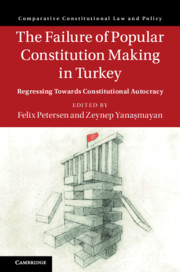Book contents
- The Failure of Popular Constitution Making in Turkey
- Comparative Constitutional Law and Policy
- The Failure of Popular Constitution Making in Turkey
- Copyright page
- Contents
- Figures
- Contributors
- Part I Introduction
- Part II Contextualizing Constitution Making in Turkey
- 2 The People and Its Embodiment: Authoritarian Foundations of Constitutions in Turkey
- 3 Regime Cycles, Constitution Making, and the Political System Question in Ottoman and Turkish Constitutional Developments
- 4 Illiberal Media and Popular Constitution Making in Turkey
- Part III Debating and Drafting the Constitution in 2011–2013
- Appendices
- Index
2 - The People and Its Embodiment: Authoritarian Foundations of Constitutions in Turkey
from Part II - Contextualizing Constitution Making in Turkey
Published online by Cambridge University Press: 19 December 2019
- The Failure of Popular Constitution Making in Turkey
- Comparative Constitutional Law and Policy
- The Failure of Popular Constitution Making in Turkey
- Copyright page
- Contents
- Figures
- Contributors
- Part I Introduction
- Part II Contextualizing Constitution Making in Turkey
- 2 The People and Its Embodiment: Authoritarian Foundations of Constitutions in Turkey
- 3 Regime Cycles, Constitution Making, and the Political System Question in Ottoman and Turkish Constitutional Developments
- 4 Illiberal Media and Popular Constitution Making in Turkey
- Part III Debating and Drafting the Constitution in 2011–2013
- Appendices
- Index
Summary
This chapter examines the constitution-making processes in the history of the Turkish Republic to provide an alternative explanation for the authoritarian foundations of Turkish constitutions different from the established explanations based on the center-periphery dichotomy or military tutelage argument. Drawing on Claude Lefort’s theory of modern democracy, the chapter argues that the dominant constitution-making practice in Turkey has been the hegemonic-totalitarian logic, which causes the performative closing of the empty place of power by one actor that claims to exclusively represent the people’s will. This embodiment claim constitutes the authoritarian foundation of Turkish constitutions. These embodiment claims were made by the Republican Peopleʼs Party for the 1924 Constitution, by the military following a coup for the 1961 and 1982 Constitutions, and by the Justice and Development Party as a populist actor holding the parliamentary majority in the 2007, 2010, and 2017 amendment processes. The Constitutional Conciliation Commission ‘Anayasa Uzlaşma Komisyonu, AUK’ could have achieved a democratic departure from the path-dependent authoritarian constitution-making approach.
Keywords
- Type
- Chapter
- Information
- The Failure of Popular Constitution Making in TurkeyRegressing Towards Constitutional Autocracy, pp. 59 - 83Publisher: Cambridge University PressPrint publication year: 2020
- 3
- Cited by

